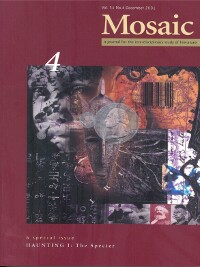Issue 34.4
Overview

Special Issue: Haunting I: The Specter
Published: December 2001
View the issue introduction or see the issue summary and contents below.
11 essays, totalling 224 pages
$17.95 CAD
“The specter, in this special issue of Mosaic, is a theoretical and political ‘reality’ that haunts the discourse of the centre,” writes Editor Dawne McCance in her introduction. Of particular note is her interview, alongside Robert Kroetsch, with William Spanos. Also included are essays that often approach texts from a historical or postcolonial perspective. Among such texts are Assia Djebar’s Fantasia, Ama Ata Aidoo’s Anowa, and James Joyce’s Ulysses, as well as stories from Ireland, France, and more.
Bill Spanos in ConversationRobert Kroetsch and Dawne McCance On the morning of 2 February 2001, Dawne McCance (DM) and Robert Kroetsch (RK) conducted the following interview on haunting with William Spanos (WS) at his home in Castle Creek, New York. | |
The Specter of History: Rethinking Thinking in the Post-Cold War AgeWilliam W. Spanos Countering the representation of the end of the Cold War as the end of History, this essay argues for the urgent need to think the positive, anti-imperialist, possibilities for thought and practice of the Heideggerian “Nothing” that, in different forms, haunts liberal capitalist democracy. | |
Specters of Orientalism in France, Algeria, and Postcolonial StudiesMichael O'Riley Even as postcolonial criticism attempts to intervene, revising colonial and orientalist histories, it remains haunted by colonial-era orientalist impulses. This essay examines the problematic in the context of Franco-Algerian cultures through the work of two Francophone writers, Azouz Begag and Leïla Sebbar. | |
“Exhuming Buried Cries” in Assia Djebar’s FantasiaNancy Von Rosk Situating Assia Djebar’s novel Fantasia: An Algerian Calvacade within recent critical debates in postcolonial and feminist theory, this essay argues that the negotiation of a female postcolonial identity is intertwined not only with the politics of language but also with the need to transcend the trauma of the past. | |
The Uncreating Conscience: Memory and Apparitions in Joyce and BenjaminJames A. Hansen Drawing on Judaic notions of Messianic time, this essay evaluates the dialectical and political implications of the “Scylla and Charybdis” episode of Ulysses in light of Walter Benjamin’s conception of the “Now-Moment.” | |
Rethinking the Specter: Ama Ata Aidoo’s AnowaAssimina Karavanta This essay explores Aidoo’s vigorous contribution to the rethinking of global postcolonial politics. By focussing mainly on Aidoo’s Anowa, it construes the potential dynamic of the specter as the embodiment of an ontological predicament and as a theoretical configuration. | |
“Preying on Foresaid Remains”: Irish Identity, Obituaries, and the Limits of MourningDuncan Greenlaw Following Jacques Derrida, this essay traces a work of mourning in Irish obituaries and in its discourses of nationalism. The essay shows how Irishness is both established and exceeded through memories of Beckett, Yeats, and Joyce, and suggests that mourning can contribute to affirmative revaluations of Irishness. | |
Gilman’s Arabesque WallpaperMarty Roth Gilman’s “The Yellow Wallpaper” proclaims its implication in the culture of nineteenth-century imperialism through the image of arabesque wallpaper. The tales of Edgar Allan Poe and the traditional Anglo-American haunted house tale provide a lineage for Gilman’s story. | |
“Haints”: American Ghosts, Ethnic Memory, and Contemporary FictionArthur Redding “Haints” explores how cultural practices articulate individual or collective subjective sensibilities by excavating alternative histories, by imaginatively summoning into presence those voices sacrificed to the consolidation of American literary and cultural traditions. With reference to Toni Morrison’s Beloved, this essay examines the resonance of a haunted past within a multicultural society. | |
Addressing a Dead Body: From Dedication to Tele-CommunityShu Kugé This essay explores the promise of an “open” community suggested in a poem written in the early to mid-eighth century by Kakinomoto no Hitomaro. The poem is addressed to an anonymous corpse washed up on a shore. | |
Jack Spicer’s Ghosts and the Immemorial CommunityRoss Clarkson Jack Spicer’s poetry is not a pursuit of the ideal of community, but rather his work is an instance of community. One of the most significant aspects of a community is its relationship to, and communication with, the dead. This essay explores Spicer’s relationship to the dead poet Garcia Lorca through his book After Lorca, and Lorca’s relationship to the immemorial community in Textbook of Poetry. |